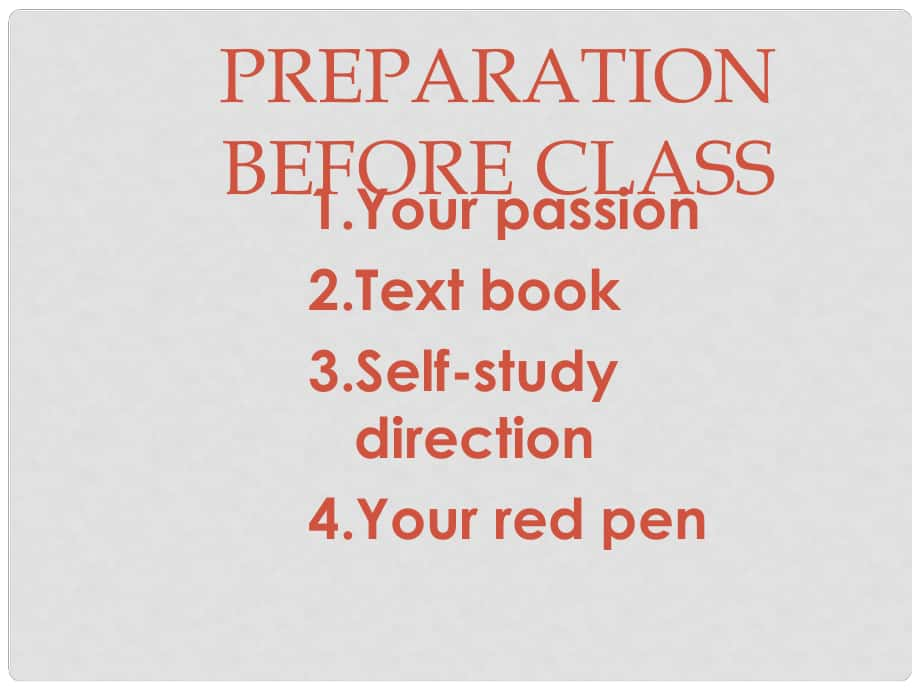《浙江省江山實(shí)驗(yàn)中學(xué)高中英語(yǔ) unit 2 English around the world using language2課件 新人教版必修1》由會(huì)員分享���,可在線閱讀���,更多相關(guān)《浙江省江山實(shí)驗(yàn)中學(xué)高中英語(yǔ) unit 2 English around the world using language2課件 新人教版必修1(17頁(yè)珍藏版)》請(qǐng)?jiān)谘b配圖網(wǎng)上搜索。
1���、PREPARATION BEFORE CLASS1.Your passion2.Text book3.Self-study direction4.Your red pen LETS SEE A VIDEO ABOUT TWO PROGRAMS (PAY ATTENTION TO ITS LANGUAGE) Which program do you think is using standard English ? If the other program is not using standard English, can everyone understand ?videoAPPRECIAT
2���、E A PASSAGE STANDARD ENGLISH AND DIALECTSLEARNING AIMS Understand the text deeply, master the basic knowledge and improve your fast reading and writing ability. Through self-directed study and cooperation, learn the methods of summarizing main ideas and analyzing. Learn about the development of dial
3���、ects; and enjoy the happiness of reading with your passion.CHECK YOUR ANSWER 1. F F F T F F 2 . D D 3. P1 What is standard English. P2 When people use words and expressions different from the “standard language, it is called a dialect. P3.Geography plays an important part in making dialects. 4.單詞:?jiǎn)卧~
4、: (1)標(biāo)準(zhǔn)的標(biāo)準(zhǔn)的 (2)詞語(yǔ)���,表達(dá))詞語(yǔ)���,表達(dá) (3)方言)方言 (4)中西部的)中西部的 (5)辨認(rèn)出;承認(rèn))辨認(rèn)出���;承認(rèn) (6)東南方的)東南方的 (7)西北方的)西北方的 (8) 西班牙的西班牙的 (9)非洲的)非洲的 短語(yǔ):短語(yǔ):(1)信不信由你)信不信由你 (2)不同于)不同于 (3)世界各地)世界各地 (4)和)和一樣一樣 (5)參與���;扮演角色)參與;扮演角色 (6)詞匯表達(dá))詞匯表達(dá)discussion內(nèi)內(nèi)容容1. 預(yù)習(xí)案中的問(wèn)題(預(yù)習(xí)案中的問(wèn)題(2minutes)2. 探究點(diǎn)一���、二(探究點(diǎn)一���、二(10 minutes)要要求求1) First have a one-to-
5、one discussion and then you can turn to other students.(先分(先分層���,再跨層次)層���,再跨層次)2) Group leaders: Allocate(分配分配) the task Control the time and process. Mark the question that cant be solved.3) Be efficient and active enough to show yourselves.presentationcontentsplacesgroups requirements探究點(diǎn)一探究點(diǎn)一 1.frontG
6���、3.G4 1.1.展示人員展示人員討論結(jié)束討論結(jié)束前前2 2分鐘到位,認(rèn)真書分鐘到位���,認(rèn)真書寫,寫���,脫稿展示脫稿展示���!不僅展示結(jié)果,更重不僅展示結(jié)果���,更重要的是要的是黃筆黃筆寫清小結(jié)寫清小結(jié)規(guī)律方法的總結(jié)規(guī)律方法的總結(jié)2.2.非展示人員非展示人員繼續(xù)討繼續(xù)討論���,完成后論,完成后立即坐下立即坐下大聲朗讀課文大聲朗讀課文���。(組���。(組長(zhǎng)負(fù)責(zé)提醒!)長(zhǎng)負(fù)責(zé)提醒?��。?2. frontG2 G7探究點(diǎn)二探究點(diǎn)二 1.frontG6 G1 2.backG8 G9 3.backG5COMMENTTips1. 點(diǎn)評(píng)的同學(xué)面向同學(xué)���,聲音洪亮���,教態(tài)自然,語(yǔ)言簡(jiǎn)潔精煉.2.非點(diǎn)評(píng)的同學(xué)認(rèn)真聽(tīng)���,積極做筆記���,積極思考.A
7、NSWERS IN DISCUSSION PART 探究點(diǎn)一1. The passage is mainly about the concept of standard English and dialects and how dialects formed.2. Yes, I think it is necessary. Because if we speak standard Chinese, it is easy to communicate with each other and we can avoid some misunderstandings. / No, I think di
8���、alects are one of cultures. We should protect our cultures and not forget our root. 探究點(diǎn)二 1. 定語(yǔ)���;先行詞;that/in which/不用 2. 表語(yǔ)���;定語(yǔ)���;這是因?yàn)樵缙诘碾娕_(tái)節(jié)目里,人們期望新聞播音員所說(shuō)的英語(yǔ)是最好的英語(yǔ)���。 3.信不信由你���,世界上沒(méi)什么標(biāo)準(zhǔn)英語(yǔ)���。;信不信由你���;插入語(yǔ);to be honest, to tell the truth; generally speaking, for example1. How to do the question referring to details
9���、.Tips: put yourself into the writers shoes. Skills: To find the answer from the text with the question he / she gives you.e.g. From the second line in the text you can conclude the first statement in “True or False” is wrong.2. How to find a main idea of a passage?Tips: not too general, not too spec
10���、ific.skills: Find out topic sentences / key words Paragraph 1: What is standard English.Paragraph 2: what is dialect.Paragraph 3: geography plays an important part in making dialect.當(dāng)堂檢測(cè)1.Please _ us in the discussion. Id like to, but Im _busy at the moment. A. attend; too B join; much too C. take p
11、art in; much too D. join; much B join sb. in sth./doing sth. much too adj. too much n. U2. The number of people who can buy their own houses _ more than 80,but a number of houses _. A. are; hasnt been built B. are; has built C. is; havent been built D. is; have built C the number of v. 單 a number of
12���、 a lot ofv. 復(fù) 3.I like the kind way _ he speaks to me. I share the idea with you. A. which B. in that C. that D. by which C the way 作先行詞時(shí)定語(yǔ)從句的引導(dǎo)詞用作先行詞時(shí)定語(yǔ)從句的引導(dǎo)詞用 in which/ that/不用不用Welcome our English monitor Summary & AssessmentSummary & Assessment Write a composition about “Why should we learn English?” Tips: please use the following words and expressions: express, recognize believe it or not play a part in Homework
 浙江省江山實(shí)驗(yàn)中學(xué)高中英語(yǔ) unit 2 English around the world using language2課件 新人教版必修1
浙江省江山實(shí)驗(yàn)中學(xué)高中英語(yǔ) unit 2 English around the world using language2課件 新人教版必修1

